
1. Over a 24-hour period we can process up to 70,000 thoughts, even as we sleep. Each day contains 86,400 seconds, so that equates to a different thought every 1.2 seconds, or two thoughts for every heartbeat. Basically, your brain never shuts up! Your brain never stops!
|

2. Left unchecked, this incessant chatter can turn to the dark side and become an chorus of self-criticism and blame. Negative thinking – about our woes, fears regrets and hurts - can become much more persuasive and dominant than the positive and supportive kind.
|

3. These thoughts tend to become stuck and repetitive — leading to anxiety, depression and burn-out. Only by freeing ourselves from them can we grow calmer, more focused, more present and happier.
|
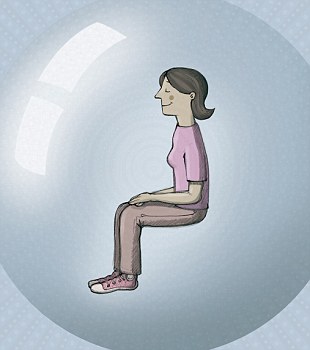
4. THERE is a simple solution: Meditation has been proven to ease stress, improve metabolism, reduce pain, lower blood pressure and enhance brain function. And all you need to do is. .. nothing. Any time is great, but one of the best times is half an hour before you typically get up. If you are waking in the night, get up and meditate, as you will settle back down to sleep a lot easier.
|

5 Find a firm but comfortable chair and a blanket to keep warm. Sit in the quietest room in the house and make your space as snug and peaceful as possible. Keep a soft light on to stop yourself nodding off.
|
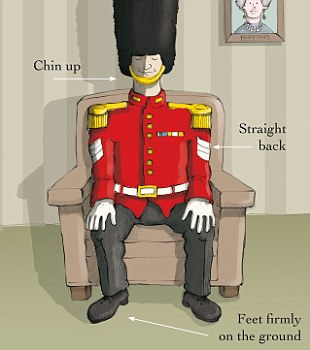
6 Your posture should be upright and symmetrical. Think of a Buckingham Palace guard — alert but relaxed. Put your hands on your lap and keep your chin up.
|

7. For best results, ‘hush-proof’ your surroundings. Take your landline phone off the hook, turn off your computer and mobile, and banish your family from the room. You can even wear earplugs.
|
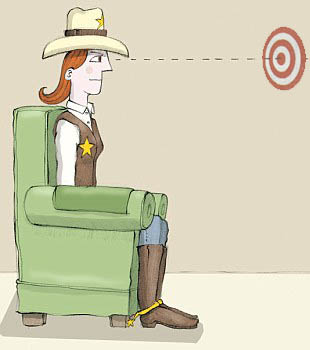
8 Find a spot on the wall directly in front of you and give it the 1,000 yard stare. Take six deep breathes, soften your focus and close your eyes. Focus on the sounds outside the room. You might hear cars and the wind. Next, bring your focus to the sounds within the room – a clock, perhaps.
|
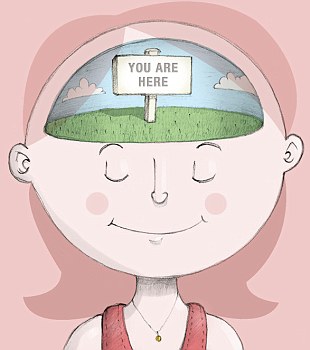
9 Now, listen to the sounds inside your body — your breath and heartbeat. This is where your attention should be, within yourself. Don’t think, just focus on your breath.
|
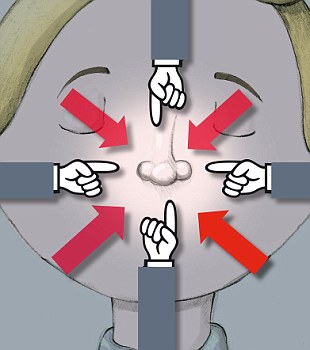
10 Keep thinking about your breath. Imagine your nose as a lighthouse from which you take all your bearings. If you feel you’re losing your focus, concentrate once more on your breath. If you feel uncomfortable, move gently and come back to your breath. Just keep breathing in and out, nice and slow and steady.
|

11 It is a well-known fact that smiling helps release endorphins (the brain’s natural relaxant), so as you relax picture yourself with a gentle smile. You’ll probably find by doing this you will have one during the meditation.
|

12 Your thoughts will naturally bubble to the surface; things you have to do, memories of painful conversations, frustrations and self-criticism. The most important thing is not to get upset with yourself. Thoughts during meditation can be the mind’s way of releasing stress. But there is still great benefit in sitting quietly.
|
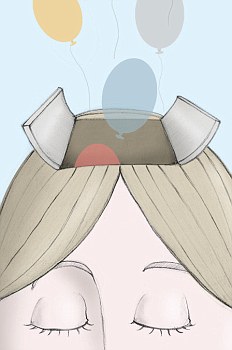
13 Do not pursue these thoughts, judge them or reject them. Simply acknowledge them, then let them go.
|
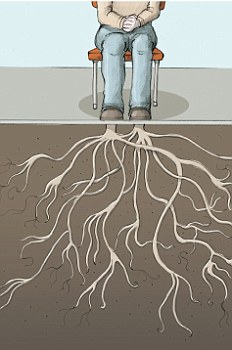
14 Each time you breathe, think of your feet growing roots into the floor. The deeper the roots, the deeper the meditation. This thought anchors you and keeps you centred.
|

15 After 20 minutes, reel yourself in and gradually bring your awareness back into the room. When you’re good and ready, take a few deep breaths, fill the lungs and gently open your eyes.
|

16 Before you get up, sit for a minute. Think about the day ahead or the day just gone. Think about what you have to be grateful for. Think about how peaceful you feel in this moment – and keep that with you. Most of all, feel proud — you’ve managed to meditate.
|